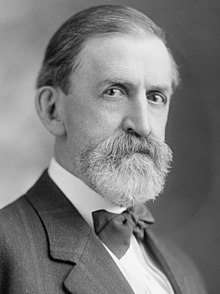John W. Kern | |
|---|---|
 | |
| Chairman of the Senate Democratic Caucus | |
| In office March 4, 1913 – March 3, 1917 | |
| Deputy | J. Hamilton Lewis |
| Preceded by | Thomas S. Martin |
| Succeeded by | Thomas S. Martin |
| United States Senator from Indiana | |
| In office March 4, 1911 – March 3, 1917 | |
| Preceded by | Albert J. Beveridge |
| Succeeded by | Harry New |
| Member of the Indiana Senate from Marion County | |
| In office 1893–1897 Serving with Romeo F. Stuart, James McHugh | |
| Preceded by | Henry C. Thompson, Henry T. Hudson |
| Succeeded by | Martin M. Hugg, Harry New |
| Personal details | |
| Born | December 20, 1849 Alto, Indiana, U.S. |
| Died | August 17, 1917 (aged 67) Asheville, North Carolina, U.S. |
| Political party | Democratic |
| Education | University of Michigan, Ann Arbor (LLB) |
John Worth Kern (December 20, 1849 – August 17, 1917) was a Democratic United States Senator from Indiana. While the title was not official, he is considered to be the first Senate majority leader (and in turn, the first Senate Democratic Leader), while serving concurrently as chairman of the Senate Democratic Caucus. He was also the Democratic vice presidential nominee in the 1908 presidential election.
Born in Alto, Indiana, Kern practiced law in Kokomo, Indiana, after graduating from the University of Michigan Law School. He won election to the Indiana Senate before serving as the city solicitor of Indianapolis. After running unsuccessfully for the position of Governor of Indiana, Kern was selected as the vice presidential nominee at the 1908 Democratic National Convention. The Democratic ticket of William Jennings Bryan and Kern was defeated by the Republican ticket of William Howard Taft and James S. Sherman.
Kern won election to the United States Senate in 1910, becoming a progressive ally of President Woodrow Wilson. He was elected Chairman of the Senate Democratic Caucus and helped pass several major pieces of legislation, including the Clayton Antitrust Act, the Revenue Act of 1913, and the Federal Reserve Act. He also introduced the Kern Resolution, which led to the investigation of conditions in coal mines, and supported passage of the Seventeenth Amendment. He was defeated for re-election in 1916, losing to Republican Harry Stewart New, and Kern died the following year.